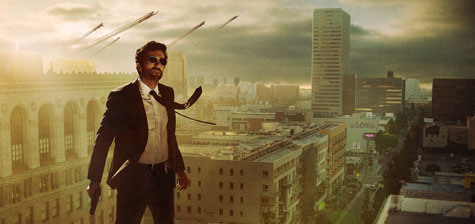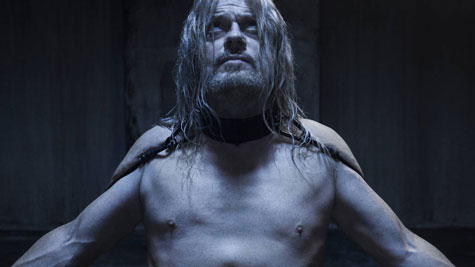
Debuting on Sony's Playstation Network as their first original scripted show, Powers is an odd bird; a lot of labels could be applied to it, but none of them really fit.
It was based, loosely, on a comic book series, but it's not a comic book show like The Flash or Supergirl; its protagonists are a cop and his partner, but it's not a cop show; it's got nothing to do with video games, despite its network; and it's not exactly psychological suspense or horror, though it brings elements of both into the mix. If I had to label it anything, I'd call it a sci-fi drama.
Comparing it to the printed source material from which it was derived is a loser's game; creator Brian Michael Bendis handed his creations to Charlie Huston, who remixed and recut the pieces to create something unique. Weighed on its own merits, the show does some things right and botches others—ending up as something that surprises, for all of the genre conventions it borrows, and delivers on at least a few fronts.
The first episode, imaginatively titled “Pilot,” does about half the work it's supposed to do, introducing us to the world and its players.
Sharlto Copley plays Christian Walker, an unshaven cop roughly one primal scream away from a complete breakdown. Walker works for the L.A.P.D.'s Powers Division, a section of the police that investigates crimes and homicides involving super-powered heroes and villains (both are called “Powers,” possibly because DC and Marvel have jointly trademarked the word “superhero”). One of these apprehended supercrooks kills Walker's partner, and his new copilot on L.A.'s mean streets, Deena Pilgrim (Susan Heyward), helpfully provides a sounding board for the exposition.
There's also a lot of backstory that the initial episode has to deliver. Walker is a former Power himself—a crime fighter known as Diamond, who belonged to a supergroup before he lost his powers in a battle with his mentor, a homicidal fiend named Wolfe (Eddie Izzard).
Copley is a very watchable actor who knows his way around fantastical material, and he does a good job with his role, though for most of his scenes in the first episode he scowls, squints, scoffs, and otherwise glowers his way through sunny L. A. exteriors and sets. Even without knowing about Walker’s background, it's clear that he's lost something and now occupies an uncomfortable place in the world.
Walker and Pilgrim are called in to investigate the death of a Power named Olympia (Adam Boyer)—a former teammate of Walker's back when he was Diamond. Why the police, who know Walker's history, would assign him to investigate the death of his ex-colleague is the first sign that Powers isn't interested in an accurate depiction of police work.
Watch every episode of the 1st season for free on Crackle.
A groupie who witnessed Olympia's death begins to offer hints of the show's theme: the girl, Calista (Olesya Rulin), is interested in becoming a Power, which apparently can happen, at least temporarily, when a person beds a Power. And, on the other side of the coin, Walker is just as desperate to get his super Powers back.
So here we have it—the show is the story of fragile humans who, having seen the transcendent abilities of these ultra-humans, are desperate to experience that level of invulnerability for themselves—or who are desperate to get that invulnerability back.
When Powers introduces Wolfe, played by Eddie Izzard, it reinforces its theme with the force of a thunderclap. Chained to the floor of a bleak underground cell, blood dribbling from his eye where an industrial pick is inserted daily to keep him lobotomized, Wolfe is the series' exclamation point.

Eddie Izzard spent years proclaiming himself to be a fearless, boundary-breaking actor ready to take his performance to places other actors would never dare to go, then subsequently signing on for shitty mainstream projects like Cars 2 and Ocean's 13. It's not hard to see why he took the part of Wolfe—it's an insane role, and his performance is pure nightmare. (I'm going to admit here that I haven't seen him in Hannibal).
Wolfe apparently mentored several young super-powered hero-wannabes—“Powers kids” in the show's parlance—once upon a time, before he revealed his predilection for cannibalism and mass murder. And he didn't just eat people one by one—he vacuumed roomfuls of people into his maw, decorating his surroundings and himself with enough blood to fill the Great Lakes. Encountering him in his cell, we see him butt-naked, except for his shackles, disoriented from his recent icepick-to-the-eye brain massage, muttering prophecies of horrors to come.
Someone, just give Izzard an Emmy already.
There are a few things not to like about Powers: One is the tendency, perhaps owing to budget limitations, to have characters tell each other about significant episodes in their past, rather than showing them—we're told, for example, that Walker captured Wolfe, never shown it. Another big problem is the show's soundtrack, put together from a bunch of industrial synth loops and sounding cheap.
But the toll of superhuman abilities, both on the people who have them and on the people around them, is put through interesting variations, and it's intriguing to see how this theme works with cop-show elements and comic conventions. The theme develops in Episode Two—so, let us go onward.
Continue to Episode Two: “Like a Power”
Hector DeJean can frequently be found in comic stores, bookshops, and the Eighties. His serialized story of a private detective who only solves food-related crimes is no longer online.
